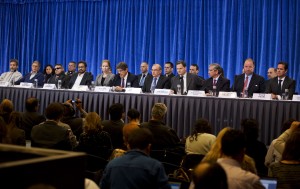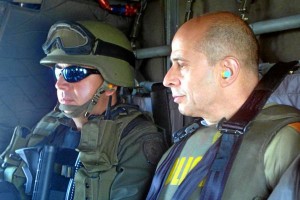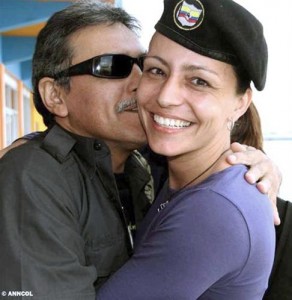
The Revolutionary Armed Forces of Colombia (FARC) began peace negotiations Havana, Cuba on Nov.19 with a surprise announcement of a unilateral suspension of armed attacks. In Colombia some groups assert that peace depends on the political will of the guerrillas, but what conditions exist for a successful process?
The peace talks that the Colombian government has advanced with the FARC began with the formal announcement from President Juan Manuel Santos, who informed the public about the beginnings of a new peace process in Colombia with an agenda focused on five points: a) formation of a policy on comprehensive agricultural reform b) political participation for members of FARC who disarm c) an end to the armed conflict d) a solution to drug trafficking and e) attention from the State towards victims of violence. This agenda was achieved after months of talks and secret meetings with the FARC and it put an end to speculation that a peace process was imminent.
One of the lessons learned in the past according to President Juan Manuel Santos is to engage in dialogue discretely out of the media spotlight. For this reason a protocol for the process was established in Oslo, Norway on Oct. 17 and with the dialogue beginning in Cuba. These two countries were the guarantors in the process while Chile and Venezuela played a supporting role.
Who comprises the negotiation team?
The negotiation team for the Colombian government is composed of Humberto de La Calle, former Vice President of Colombia during the Administration of Ernesto Samper, Sergio Jaramillo, High Commissioner of Peace, General Jorge Enrique Mora, Ex-Commander of the Armed Forces, Oscar Naranjo, Ex-Director of the National Police Force and adviser to recently elected President Enrique Peña Nieto of Mexico, Frank Pearl, Ex-High Counselor for Peace and Ex-High Counselor for Reintegration (Presidential Program for Reintegration of Combatants), and Luis Carlos Villegas, President of the National Association of Industrialist (ANDI).
 On their behalf, the FARC negotiation team is composed of Luciano Marin, also known as “Ivan Marques,” member of the Secretariat and Commander of the Eastern Bloc. Other members, designated spokespersons plenipotentiaries, include Luis Alberto Alban, or “Marco Leon Calarca,” Jesus Emilio Carvajalino, alias “Andres Paris” and Ricardo Gonzalez, alias “Rodrigo Granda.” This team also has two members of special symbolic value to the FARC: Juvenal Ovidio Ricardo Palmera, alias “Simon Trinidad”, a financial advisor with a graduate degree from Harvard University, who joined the FARC after the persecutions that cost the leftist political party Union Patriótica thousands of lives. He is currently detained in federal prison in Virginia but the FARC claim him as a spokesperson and request his presence at the table of dialogue.
On their behalf, the FARC negotiation team is composed of Luciano Marin, also known as “Ivan Marques,” member of the Secretariat and Commander of the Eastern Bloc. Other members, designated spokespersons plenipotentiaries, include Luis Alberto Alban, or “Marco Leon Calarca,” Jesus Emilio Carvajalino, alias “Andres Paris” and Ricardo Gonzalez, alias “Rodrigo Granda.” This team also has two members of special symbolic value to the FARC: Juvenal Ovidio Ricardo Palmera, alias “Simon Trinidad”, a financial advisor with a graduate degree from Harvard University, who joined the FARC after the persecutions that cost the leftist political party Union Patriótica thousands of lives. He is currently detained in federal prison in Virginia but the FARC claim him as a spokesperson and request his presence at the table of dialogue.
 Another media figure for the FARC during this process has been the Dutch guerrilla, Tanja Nijmeijer, alias “Alexandra”, who was thought to have been kidnapped until a few years ago when one of her diaries detailed her voluntary enlistment in the FARC. She not only represents an attractive figure for the media similar to a feminine, contemporary “Che” Guevara but also an opportunity for the FARC to restore their tattered international image.
Another media figure for the FARC during this process has been the Dutch guerrilla, Tanja Nijmeijer, alias “Alexandra”, who was thought to have been kidnapped until a few years ago when one of her diaries detailed her voluntary enlistment in the FARC. She not only represents an attractive figure for the media similar to a feminine, contemporary “Che” Guevara but also an opportunity for the FARC to restore their tattered international image.
The two negotiation teams demonstrate two extremes of a country that has not achieved a solution to this extended, armed and social conflict. On one side stand the military and industrialists and on the other an anachronistic guerrilla group, which benefits from the same drug trafficking as corrupt politicians and military officials. In the middle falls civil society, who demand a place at the table. This initiative, however, has been rejected by the Colombian government, at least for now.
Peace process or unconditional surrender?
After the unveiling the beginnings of a peace process, Colombian military leaders announced their position in September through the Colombian Association of Retired Officers (ACORE), a union that wields great political power thanks to its membership being comprised of high-ranking retired military officials and a strong influence over troops. In their press release they emphasize removing any possibility of political participation for combatants who disarm in spite of the thousands of criminal cases that have linked members of military forces to either drug trafficking or the murder of civilians. Despite this they point out: “we don’t want terrorists exercising positions of power while military officers having legally defended this nation under the constitution are convicted, humiliated and imprisoned around the country.”
The press release also indicates that any discussion regarding budget allocations for the armed forces, military courts or special regime, who enjoy salaries and pensions, represent non-negotiable terms. Furthermore, they requested a seat at the table with three military officers, three of whom today form the negotiation team for the Colombian government. The military perceives the incipient leftist social and political movement “Marcha Patriótica” as a threat, which they describe as the “political arm of the terrorist organization.” They demand that said “political movement be extinguished. Until then an agreement to put an end to the armed conflict won’t be reached.”
That being said, for the military the peace process should not only guarantee them the same privilege and impunity that military jurisdiction offers in some cases, but also the guerrilla’s complete immobilization and disarmament, the dismantling of drug-trafficking as well as criminal proceedings for atrocious crimes against humanity (for the guerrillas). Obviously the peace process has a price and no military will disarm without something in exchange. Talks will quickly fall apart at the dialogue table if there is no guarantee and each party cedes some demands.
President Santos’ administration, in turn, also believes they can negotiate quickly due to the weakness of the guerrillas and the military attacks they have received in recent years. It is evident that they were decimated by military action but the belief that their immobilization can be achieved with the promise of electoral participation following the annihilation of the Patriotic Union, brought about precisely in another peace process as a peaceful alternative to access to power, is naive. It is a mistake that may impede any real progress.
The Orphanhood of Civil Society in the Peace Process
While multiple social organizations have requested to be at the table of dialogue, the protagonists continue to be those armed forces, both legal and illegal, that continue fighting their wars without consideration for victims or civilians. It is interesting that it is the FARC that has demanded the presence of civil society as opposed to the government, whose job it is to guarantee the establishment of citizen participation – a fundamental aspect of the country’s future.
Some citizens’ initiatives written by social organizations and labor unions have demanded that both the FARC and the government consider their agenda throughout the course of the dialogues. Victims searching for family members who have disappeared or who have been kidnapped by the FARC have joined the outcry, as well as those living in areas where the fighting continues to take lives on a daily basis.
Despite these demonstrations on the part of social organizations and those who have suffered the effects of the war first-hand, for a large urban majority of Colombians this process is just one attempt of many that have been tried in the past. Furthermore, a vast majority has become distrustful and weary of these efforts, and have demanded once and for all that the government reach a legitimate compromise in terms of achieving peace – not at any cost, as the military has suggested, but in a manner sufficient to stop paying the invaluable price of human life.
The challenge for all civil society organizations is to overcome their polarization and reach an agreement that focuses on preventing victimhood more than the treatment that is given to criminals.
Structural Obstacles to the Process’s Success
In the opening speeches of the process in Oslo, the spokesman for the Colombian government, Humberto de la Calle, asserted that the FARC were attempting to include issues that were not considered on the agenda, such as the complex issue of the agricultural problem, for instance, did not warrant discussion regarding land dispossession, the use of front men, and business sectors that benefit from the violence and the sale of dispossessed land, the mining boom and the presence of new paramilitary organizations, and the accumulation of land on the part of all of the violent actors including the FARC.
The government showed more interest, however, when it was Iván Márquez who rubbed salt in their wounds by addressing multiple societal demands that, incidentally, should not be part of the discourse of those who profit from income received from drug trafficking. Key issues – which have been politicized and stigmatized as leftist discourse – such as the respect for human rights, the conservation of natural resources in the face of state-run mining stimulated by the hopes of finding new “gold”, and the profound corruption and lack of ethics in every institutional apparatus are but some of the challenges facing Colombian society aside from the disarmament of the guerrillas.
The FARC’s unilateral two-month cease-fire is an important gesture, but in such a violent dynamic, various armed confrontations have already been documented since its announcement. Communications have been exchanged between the government and the guerrillas in which they mutually accuse each other of the attacks, this makes building trust necessary for a dialogue very difficult.
Even if the FARC were to disappear today, Colombia would still have to confront the increasingly sophisticated and brutal criminal organizations associated with drug trafficking, impunity and ineffectiveness in a justice system that has been on strike for a month and whose absence has not been noticed, a legislative branch co-opted by paramilitary mafias, and a public prosecutor incapable of keeping up with the rampant corruption present in each and every public sphere.
Colombian society holds the key to peace. It must look for ways to overcome the country’s deep-rooted historical conflicts that only recognize antagonistic relations and the inability of the government to negotiate the deep social divide that, ultimately, is a breeding ground for violence.
Alex Sierra R. is an anthropologist who has also worked as an independent investigator and consultant on issues such as human rights and international cooperation efforts for development and public policy in Colombia. He has worked in active conflict zones and with vulnerable communities in his country for the last 12 years. He is a monthly columnist with the Americas Program www.americas.org.
Translation: Mac Layne and Brandon Brewer
Editor: Laura Carlsen



